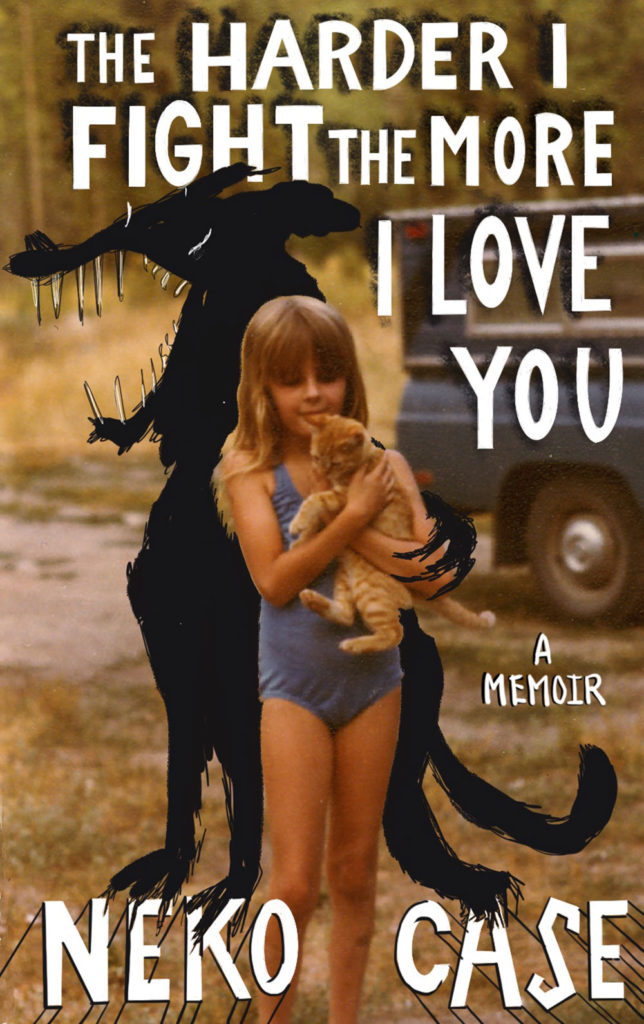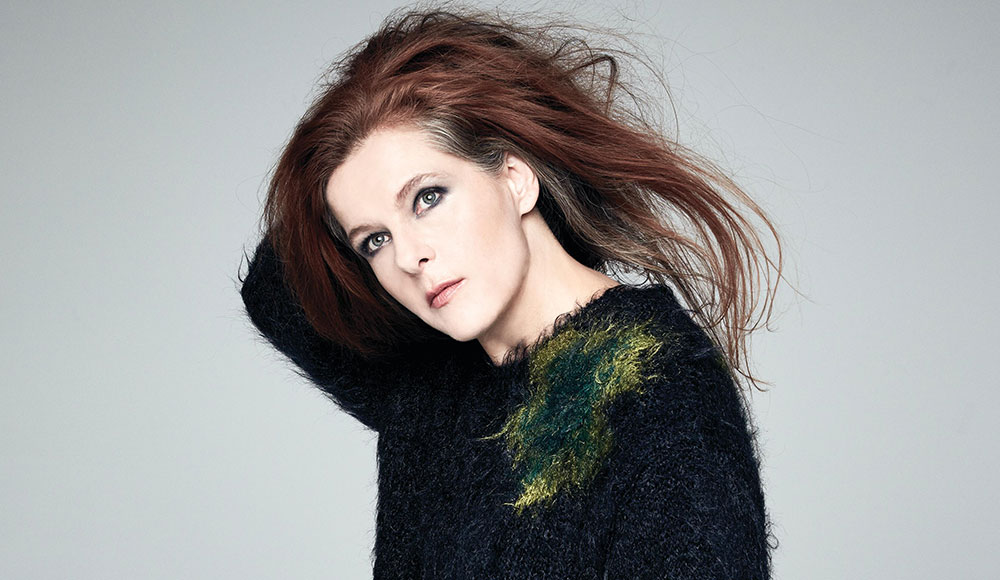If there is a frequency at which love is conveyed in song, then Neko Case can reach it.
“It’s the intention that carries it,” she corrects my metaphysics over email.
In her new memoir, The Harder I Fight The More I Love You, the well-regarded singer and musician calls her voice “a blunted point of a shape.” She’s speaking pejoratively, but many music critics have seen it as her signature power. “Lungs for days Dollywood boom,” Ryan Dombal of Pitchfork wrote. “Seems like it might level buildings,” gushed Will Hermes of Rolling Stone.
That voice has filled every recess and cranny in the Rio Theatre several times on her album tours, but Saturday it will serve a different purpose. She’ll be there reading from her memoir for an event presented by Bookshop Santa Cruz, co-sponsored by Streetlight Records and the Humanities Institute at UC Santa Cruz. The evening will be emceed by UCSC alumna Kate Schatz, Bay Area author of the Rad Women series with illustrator Miriam Klein Stahl.
Case is “shocked” to hear that many artists skip Santa Cruz as a flyover city between tour stops in San Francisco and Los Angeles.
“I love the staff at the Rio Theater,” she says. “It’s a home away from home. I love taking walks in the neighborhoods and running my hands through the huge rosemary bushes who love it there too.”
Case’s voice on the page reads much like her lyrics: brimming with synesthesiac elements, psychedelic passages infused with the power of myth, anthropomorphizing animals and animalizing humans.
During a section devoted to uncanny sights on late-night tour drives, when most of the human world is asleep but the wildlife are wide awake, she writes with a naturalist’s reverence and awe at “drifts of delicate-looking pronghorns, Oklahoma scissor-tailed flycatchers, giant Montana porcupines…pelicans suddenly rising like a swarm of army choppers over a sea cliff in Santa Cruz.”
From page three on, a beast stalks this narrative: an illustrated icon as section break, drawn in a Paul Klee style as a single line, like a desaturated neon sign of fused glass. At first I thought it was the titular creature of her seminal album, Fox Confessor Brings the Flood. Moving through the memoir becomes a game of I Spy.
“Could this be it?” you ask yourself when an animal appears. Thumb back to the icon. Squint.
After all, there is an inexplicable two-way tractor beam that runs between animals and Case. Even her first rock venue experience as a spectator was animal-centric: the defunct Gorilla Gardens, in Seattle’s Chinatown, where she saw bands such as D.O.A., Nomeansno, the Fastbacks and the Accüsed.
The icon is a layout choice that could have easily been the classic three asterisks, but it’s also the “psychopomp” from the Slavic tales her Ukrainian family spins: our guide through this textual labyrinth. For a first-time author, Case dangles reveals expertly, punctuating with cliffhangers, although she tells me those story mechanics were “juried by very experienced writers and editors.” There’s a high degree of difficulty in pausing her otherwise linear chronology for “If I only knew then what I know now” adult bias and “I was about to find out” baiting that’s so tantalizing it’s almost grating. The beast is one of those secrets, and I won’t reveal its identity here.
I say beast, but that’s me confusing animals with beasts again. Case sets us straight.
Sexual assault dogs her family like a curse—the reader must know that going in. “A violent force breathing hard behind us,” she calls it. Graphic detail is spare, but there’s a menace hanging over every page. It is not used as plot fulcrum, around which the entire narrative balances, and that narrative doesn’t position itself as a survivor’s triumph. Case finds lessons to be disingenuous as they relate to trauma because they assume causation, when life arcs are rarely that clean.
As she writes, sometimes there is a “senseless brutality that finds you.”
The Green River Killer haunts her regional TV news. Bullies swagger into her life as spectral forces and the company she does not consent to keep, an axis of exes of family members who tragicomically assume they’re going to be around forever.

And yet the ones she wants to stick around—her too-young mother and father, who take turns showing her how childless they wish they were—she is forced to chase.
Are her parents the unnamed second person in The Harder I Fight The More I Love You? Is the “fight” her perpetual pursuit of them?
That’s highly intimated, never confirmed. She writes of them: “The ways to be unwanted were inexhaustible.”
Each parent operates on a sliding scale of indifference, dictated by circumstance and need, but it’s her mother who is a “grifter” with affection as her confidence trick, and Case keeps unwittingly playing her mark.
You’d have to be made out of stone, Dear Reader, not to wince at line after heartbreaking line:
“She was the country I was from.”
“[I was] a kid attached to her by a long, ratty kite string she wanted to snip.”
“I would’ve arranged myself to die in an angel’s shape all to make her love me.”
That one made me close the book and take some muted breaths before I could resume. Your tolerance may vary.
Is it her life she’s had to fight for? She spends a lot of it bereft and adrift, and there are periods of ideation interrupted by creative bliss.
The fight could also be with her body. She struggled with her desires and interests when it came to her gender. When her first crushes hit, she’s dismayed to be attracted to humans in the first place, rather than being able to carry on her love affair with horses: “Part of me felt betrayed by my own biology.”
A “semi-genderless kid” who tomboyed to her heart’s content, in the chaos of young adulthood she longs to “unknot my chromosomes and braid them into something else.” Restoring cars and playing drums, which she does before learning tenor guitar, become a kind of rebellion.
Before she knew what kind of music she wanted to make, she fell hard for others’: Blondie’s “punk Morricone disco” and Loretta Lynn, who used to perform just one town over from hers in Washington. “Loving someone else’s art can give you a ride at least halfway to where you’re trying to go,” she writes.
On her way to that distant destination comes the reward for the reader in Chapter 20, “Enter the Glamour of a Life in Music.” This is the grand unfurling, where the trickster wit we fell in love with in her lyrics and stage banter is cranked to 11 on the amp, and what follows is the most biting, hilarious takedown (if a loving one) of a day in the life of a nameless-to-famous musician on tour. Effigies are burned, pieties are skewered as she “cracks open the stinky duck egg of rock and roll mythology.”
The chapter is so juicy, so nourishing, so unlike the tone or figurative language of everything that came before, it made me wish that the entire book had been in that style, and yet who am I to say? With this subject matter, how would that be done? It’s a bit like wanting someone raised in a North Pole bunker to set their biography on a tropical island. They wouldn’t have the vocabulary.
But if she expanded this chapter for her next book, went as wide as she could, it could easily be the Kitchen Confidential of the musician world. After all, Anthony Bourdain grew that mighty oak from his initial New Yorker piece, “Don’t Eat Before Reading This,” not of dissimilar size.
While we wait for that opus, here is her first book to absorb, humming with lines like these:
“Our voices are just lassos connecting us, carrying our love…back and forth to each other.”
Neko Case appears at 7pm on Feb. 7 at the Rio Theatre, 1205 Soquel Ave., Santa Cruz. Tickets: $37.25.














